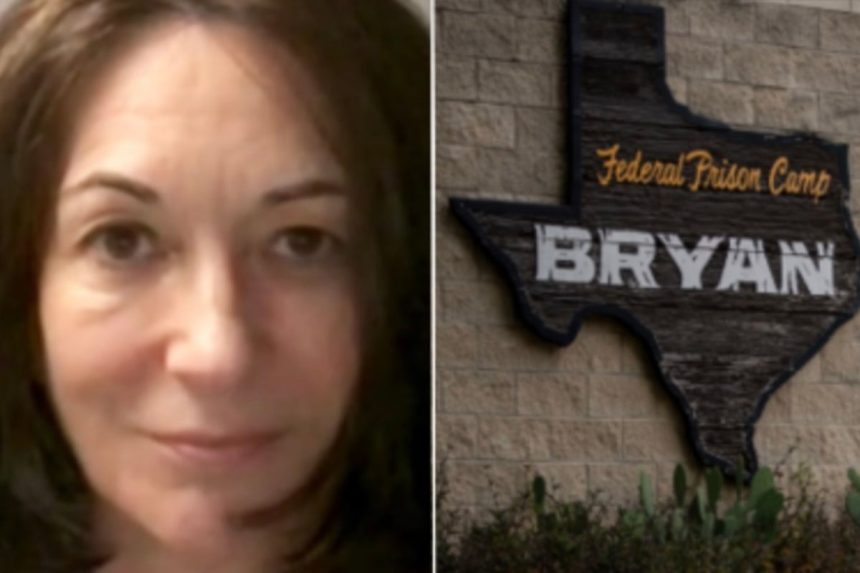Ghislaine Maxwell’s unexpected arrival at a cushy Texas prison this August has left other inmates unsettled, with some claiming it seems that she receives preferential treatment, according to a report.
Maxwell’s arrival at Bryan Federal Prison Camp, a minimum-security facility known for its relatively relaxed environment, has drastically disrupted the daily lives of her fellow inmates, The Wall Street Journal reports.
On a weekend in mid-August, not long after her arrival, inmates at the prison were forced to stay indoors during their usual outdoor time as Maxwell met with several visitors in the prison camp’s chapel, people familiar with the matter told The Journal.
The arrival of the 63-year-old former associate of Jeffrey Epstein, convicted of trafficking underage girls for the deceased financier, has led to more frequent lockdowns, more armed guards on campus and other changes at the prison, according to the report.
Current and former inmates at the usually docile prison — also the home of Theranos founder Elizabeth Holmes and Real Housewives of Salt Lake City star Jen Shah — said it seemed that Maxwell has been receiving better treatment than other inmates.
Ghislaine Maxwell’s arrival at the cushy Texas federal prison where she was transferred in August reportedly disrupted the daily lives of other inmates, according to a report (Federal Bureau of Prisons)
A majority of the inmates held there have committed white-collar crimes and face shorter sentences, or have served a larger portion of a longer sentence and are considered a low flight risk.
Because of this, Federal Prison Camp Bryan is known as being relatively low-security, without any towering fences, barbed wire or high-security cells found at more strict facilities.
The Bureau of Prisons typically prohibits sex offenders from serving time in such prisons, though they can be admitted with a special waiver, according to the report. Maxwell, who was handed down a 20-year sentence in 2022, has the fourth-longest remaining sentence out of the prison’s 600 inmates.
It was not known who Maxwell met with in the chapel that day, though some of her fellow inmates heard rumors that the lockdown was meant to accommodate important visitors, according to the report.
Later that day, one inmate said they saw Maxwell return to her dormitory with a smile on her face. When asked about her mysterious meeting, Maxwell said it went well, but didn’t share any other information, according to the report.
Meanwhile, less than a week later, the Justice Department released a transcript of an interview Maxwell had with senior official Todd Blanche weeks earlier in July.
During the interview with Blanche, Maxwell said she had never seen President Donald Trump doing anything inappropriate or illegal with Epstein when they were friends. Soon after, she was transferred to Federal Prison Camp Bryan.

Federal Prison Camp Bryan is a minimum-security prison in Texas, typically home to inmates who have committed white collar crimes
At the time, Maxwell’s lawyer, David Markus, wrote on X that the transfer was for safety reasons and came after she “faced serious danger in Tallahassee.” It was not immediately clear what kinds of safety concerns she had faced at the higher-security prison.
In addition to causing some minor inconveniences for the other inmates, Maxwell was also greeted with a wave of hostility from some. According to the report, fellow prisoners taunted her, calling her a pedophile and a “chomo” – a prison slur for child molester.
During one incident, Maxwell had politely asked an inmate to leave her room, prompting the other woman to begin screaming at Maxwell that she didn’t belong there. The inmate was then transferred to another dormitory, the report says.
Soon after, the warden organized a “town hall” and warned that if inmates made threats to Maxwell, put her in danger or talked to the press about her, they would be taken to a harsher facility, sources told The Journal.
Meanwhile, inmates told The Journal that Maxwell mostly kept to herself, especially as there was a media frenzy soon after her transfer. Still, she reportedly received preferential treatment, as guards would bring her meals to her dormitory or escort her to the recreation area for late-night workouts. Maxwell was also allowed to shower after other inmates were confined to their bunks, according to the report.
Soon after her arrival, the prison also stationed armed special operations response teams, known as SORT, at the camp’s entrance and rear gate, and kept them there around the clock.
According to the inmates, once prison officials added a black tarp to block the view out of the camp, Maxwell went outside more.

Maxwell was sentenced to 20 years in prison for her role sex trafficking young women and girls to be abused by the late financier Jeffrey Epstein (US District Court for the Southern District of New York)
With that addition, she also began getting her hair cut and colored at the prison-run salon, and visiting the cafeteria, though she would give away her vegetarian meals, claiming she couldn’t eat the food, one inmate told The Journal.
Her lawyer, Markus, declined to comment on the report to the Journal. A spokesperson for the Justice Department, which oversees the Bureau of Prisons, also declined to comment.
News of Maxwell’s mysterious meeting comes as the Supreme Court on Monday denied her appeal after asking the nation’s highest court to review her case.
After the ruling, Trump was asked if he would consider pardoning Maxwell, to which he replied: “I’d have to take a look at it.”
He then said he would have to “speak to the DOJ” and stressed that he did not know “anything” about the matter, despite the case dominating headlines for months after a bipartisan effort to force the release of case files from the Justice Department’s attempt to prosecute Epstein.









